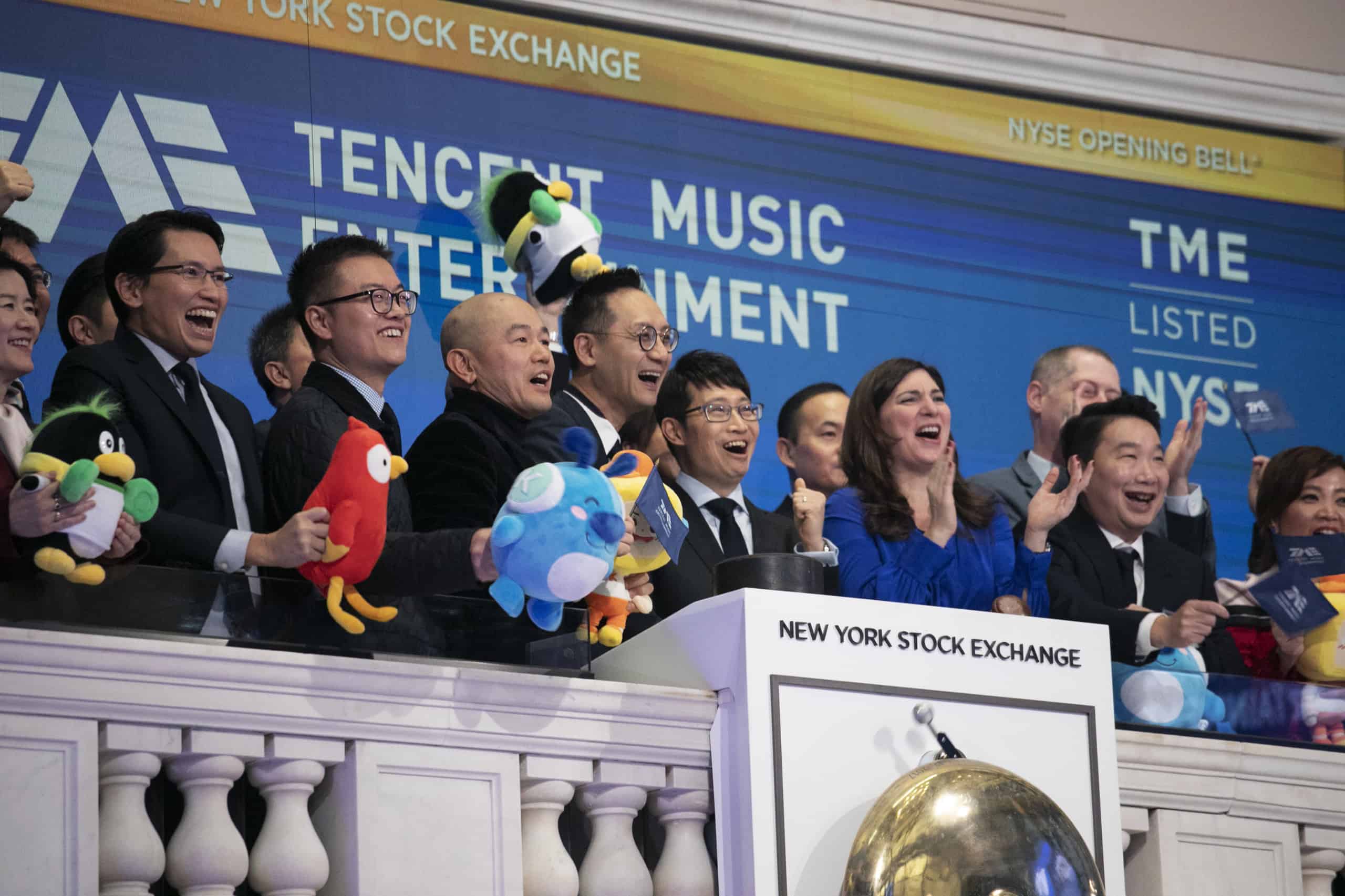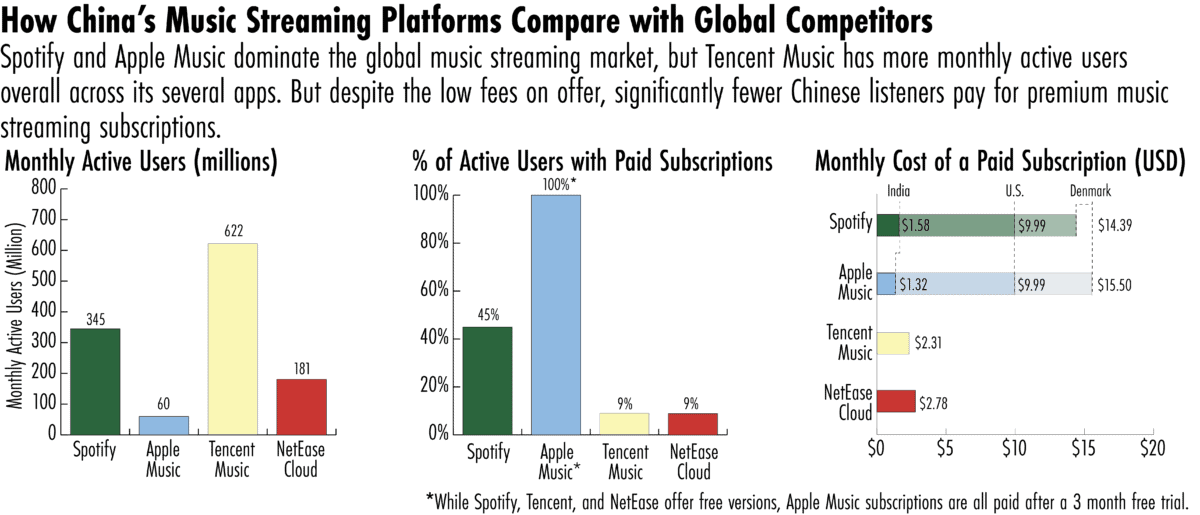
Last month, China’s market regulator barred the technology giant Tencent from holding exclusive music streaming rights and fined the company for anti-competitive behavior.
The announcement was a major setback for Tencent, which in 2016 had acquired a controlling stake in the China Music Corporation1CMC was backed by Spotify, EMI, Sony and a state-backed government fund called China Investment Corporation Financial Holdings, or CICFH, according to SEC filings and merged it with its own music division, QQ Music, to create the country’s dominant online music platform. With Beijing now stepping up its regulation of China’s biggest internet companies, and promising to root out monopolistic behavior, the spotlight has been cast on Tencent’s enormous reach in gaming, entertainment and social media apps.
In online music, Tencent wields its power through Tencent Music Entertainment Group, a company that it spun off and listed on the New York Stock Exchange in 2018. While Spotify and Apple Music dominate the global market for music streaming, Tencent Music controls about 80 percent of China’s music streaming business, according to a 2018 survey. Its closest rival, NetEase Cloud Music, had just 12 percent of the market. Alibaba’s rival music streaming service, Xiami, trailed far behind and was shuttered last January.
This week, The Wire looks at the state of China’s music streaming industry, and whether recent regulatory action will loosen Tencent’s grip on the market.

PIRATES IN COURT
A decade ago, online music piracy was rampant. Music labels complained that the Chinese internet search giant Baidu was complicit because searches on its website returned links to pirated tunes. (At the time, Baidu initially argued that it was simply a search engine linking to online sites.) But since 2015, Beijing’s push to ban pirated music online, alongside efforts by internet firms like Alibaba, Tencent, NetEase and the China Music Corporation to land exclusive licensing deals and sue their rivals into limiting their offerings, helped pave the way for the huge but segmented music streaming market that hundreds of millions of Chinese listeners now tune into.

It was Tencent, though, that dramatically altered the music landscape. In 2016, the internet behemoth best-known for QQ, WeChat and online gaming set its sights on music dominance by acquiring a controlling stake in China Music Corporation, a deal that valued the four-year-old company at $2.7 billion.2CMC grew out of two other music streaming services, Beijing Kuwo and Guangzhou Kugou. Prior to the deal, CMC had grown spectacularly with financial backing from Sony, EMI, Spotify, and a group of seasoned entrepreneurs and powerful Chinese investors. The company owned the streaming apps Kugou and Kuwo, which were ranked No. 1 and No. 3 among the most popular music streaming services. Together with Tencent’s own QQ Music, Tencent quickly seized half of the music streaming market and more than 80 percent of China’s exclusive music rights.
That was how things stood before market regulators began to move in. A year after the Tencent deal, regulators called for a truce in the legal battles between rival streaming companies, and as a result the major streaming platforms agreed to share much of their exclusive music content. Still, Tencent maintained a healthy edge over its rivals and by 2018, when Tencent’s music unit went public on the New York Stock Exchange, eight out of the top ten music streamers were using TME’s music apps.
NETEASE’S OPPORTUNITY, POSTPONED
Earlier this summer, NetEase Cloud Music’s3NetEase Cloud is a spinoff of one of China’s biggest and earliest internet giants — NetEase. fortunes were looking good. Over the course of the past year, the company had signed new licensing agreements with major labels including Universal and Warner Music, and its latest deal in May with Sony broke TME’s last monopoly over a major record label. The Chinese market regulator’s decision in July to order TME to terminate all of its remaining exclusive music licensing agreements means NetEase will soon be able to further expand its music offerings.

In many ways, NetEase is perfectly positioned to gain from the regulatory actions taken against Tencent. The company has an app that is arguably more attractive to use than Tencent’s. One of its most popular features is a vibrant comments section underneath each song, where users respond to music with emotional reactions and anecdotes. NetEase also generates revenue from its live streaming service, which brings in more than half of Cloud Music’s revenue. While TME and NetEase bring in comparable revenues per paying user from music streaming, NetEase brings in three times more revenue than TME from “social entertainment,” such as live concerts and other events. While the company has never turned a profit, it has managed to narrow its losses every year since 2018. In May, it filed to go public on the Hong Kong Stock Exchange.
But this month, the company indefinitely shelved its IPO plans amid investor anxieties over Beijing’s crackdown on technology giants. Nikkei Asia reported that “tepid feedback” from investors led NetEase to delay the listing, even though its application had already gained approval from the Hong Kong Stock Exchange.
Ironically, it seems the company best positioned to shake up the uncompetitive music streaming industry has succumbed to some of the same pressures.
NetEase declined to comment for this article. Tencent Music did not respond to a request for comment.

Eliot Chen is a Toronto-based staff writer at The Wire. Previously, he was a researcher at the Center for Strategic and International Studies’ Human Rights Initiative and MacroPolo. @eliotcxchen



